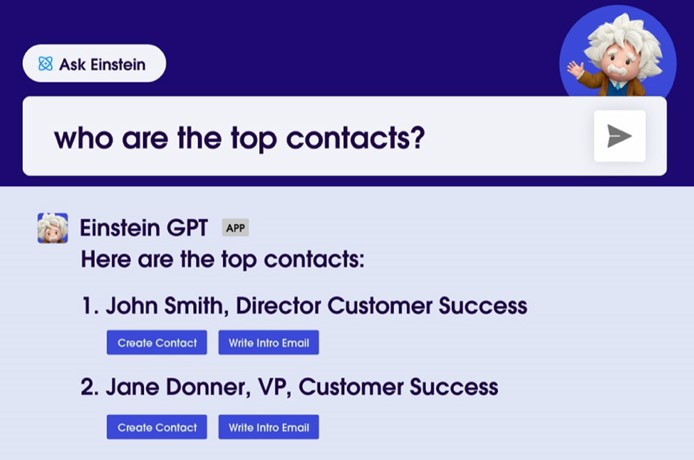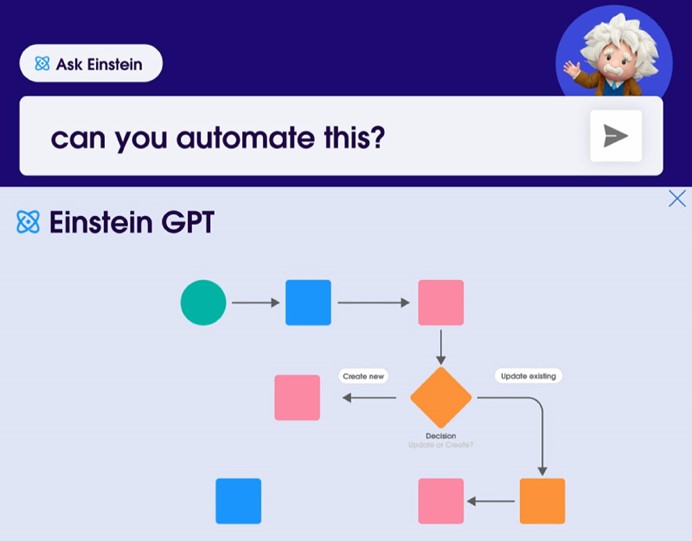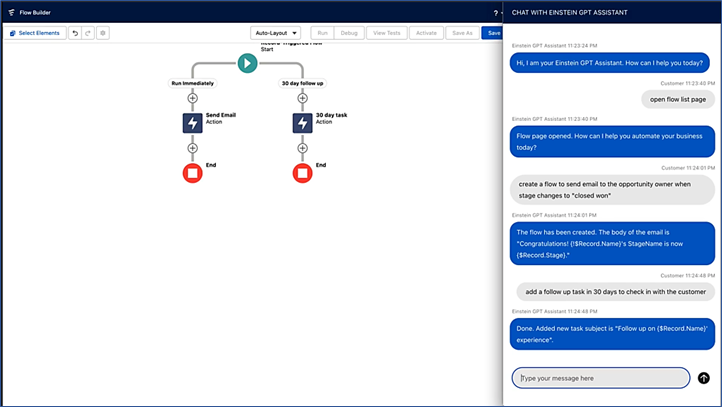As demand for generative artificial intelligence (AI) grows, Salesforce announced new Einstein GPT and Data Cloud capabilities for Flow, its portfolio of automation tools. These new capabilities can help Salesforce users create multistep, automated workflows that use real-time information, such as changes in customer behavior or market conditions, to trigger actions within the customer relationship management (CRM) system. In addition, the new AI capabilities can help users create personalized messages quickly by aggregating customer data from multiple sources synced to the Salesforce system (such as Slack, email, marketing automation tools, etc.).
Before we explore the potential benefits of integrating Einstein GPT and Data Cloud with Flow, let’s review what each of these technologies is.
Einstein GPT
Einstein GPT is a natural language processing tool powered by machine-learning technology. It’s Salesforce’s generative AI tool for CRM. Users can ask conversational questions or give simple instructions and Einstein GPT will respond with AI-generated content. See examples from Salesforce below.


Data Cloud
Data Cloud is Salesforce’s data warehouse platform; it’s designed to enable and support business intelligence activities.
In the current business landscape with third-party cookies being depreciated, companies need to collect, combine, and manage customer data internally. Data Cloud can help companies do this by leveraging a flexible data model with superabundant processing power to bring together data from multiple sources into unified customer profiles and graphs. It can help companies connect their customer data at scale from many different apps, devices, and real-time streams with out-of-the-box connectors.
Flow
Flow is Salesforce’s leading process automation tool. It can help administrators quickly and easily create various automations, like updating a record and then sending an email to the customer. Flow provides a low-code way to build automated workflows within the Salesforce CRM system.
Einstein GPT for Flow
The benefits of integrating Einstein GPT with Flow can be game changing for companies. It can help users:
- Create and edit automations using a conversational interface
- Define what kind of workflow to use and then build it, replacing the manual process of building out flow steps
- Build formulas for formula fields, validation rules, approval processes, and workflow rules, reducing the risk of mistakes within formula syntax
- Find information quickly, instead of having to search for sub-flows and invocable actions
For instance, the image below shows how Einstein GPT for Flow can generate a flow from text prompts.

With a few simple prompts, Einstein GPT for Flow can create a flow to send an email to the opportunity owner when an opportunity is won. The email includes appropriate language and merge fields based on the context of the email along with Salesforce record metadata. A follow-up task can be added to the flow easily, too, as shown above.
Ease of use may be the biggest benefit here. Entire flows can be created without a user having to manually write code.
Data Cloud for Flow
Data Cloud for Flow can help make customer experiences feel personalized and cohesive. Powering Flow with Data Cloud can help provide real-time data across all business areas. Use cases for this technology integration include:
- Marketers using automations powered by real-time telemetry data to help improve the retail experience by offering a discount as soon as a customer abandons an online shopping cart
- Sales professionals using real-time data to power dynamic pricing in eCommerce settings by automatically adjusting prices based on real-time demand and supply—as well as updating inventory levels and availability information within each appropriate database
- Financial service companies leveraging real-time data to automate fraud detection and prevention by flagging suspicious transactions based on unusual patterns, such as large withdrawals or transfers to foreign countries
- Manufacturing companies incorporating real-time data to help improve production efficiency by monitoring machine performance to trigger maintenance requests automatically
The benefits of integrating Data Cloud with Flow can be pivotal for companies. By connecting CRM workflows to systems and data across the company, Data Cloud for Flow can automatically adjust workflows and trigger actions (like sending emails and alerts) based on real-time data—from any system that’s connected to the data warehouse.
Perhaps the biggest benefit here is time savings. No one has to manually find, sort, report, and update data in multiple systems.
Availability
Both Einstein GPT and Data Cloud capabilities for Flow are planned as pilot programs in the Winter ’24 release. John Kucera, senior vice president of product management at Salesforce, emphasized Salesforce’s aim is to make AI accessible to non-technical users.
In summary, by integrating Einstein GPT and Data Cloud with Flow, users can take advantage of generative AI capabilities to help make business processes simpler. With Einstein GPT, non-technical users can find information quickly and construct complex automations using a conversational interface. Further, Data Cloud can adjust workflows and trigger actions based on real-time changes. Lastly, these AI tools can be trained with company-specific, internal data—from knowledge articles, product descriptions, and other sources—to provide relevant results. Salesforce generative AI capabilities can help companies increase efficiency and productivity.
Ready to take advantage of Salesforce AI capabilities? The Business Technology Solutions team at Forvis Mazars is a Salesforce partner with certified experience. Ask about our Salesforce support services or request a demo by using the Contact Us form below.
